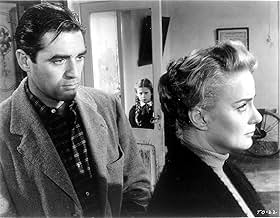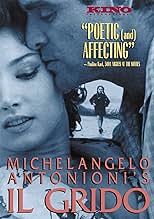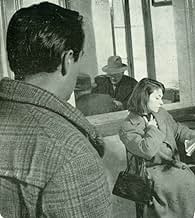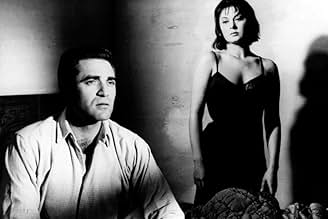VALUTAZIONE IMDb
7,6/10
5779
LA TUA VALUTAZIONE
Un uomo vaga senza meta, lontano dalla sua città, lontano dalla donna che amava, emotivamente e socialmente inattivo.Un uomo vaga senza meta, lontano dalla sua città, lontano dalla donna che amava, emotivamente e socialmente inattivo.Un uomo vaga senza meta, lontano dalla sua città, lontano dalla donna che amava, emotivamente e socialmente inattivo.
- Regia
- Sceneggiatura
- Star
- Premi
- 3 vittorie e 2 candidature totali
Gabriella Pallotta
- Edera, her sister
- (as Gabriella Pallotti)
Jacqueline Jones
- Andreina
- (as Lyn Shaw)
Pietro Corvelatti
- Fisherman
- (non citato nei titoli originali)
Elli Parvo
- Donna Matilda
- (non citato nei titoli originali)
Recensioni in evidenza
Antonioni is one of the sages of cinema, perhaps the wisest of them. His cinema is a stunning edifice; a structure rigid and harmonious as shaped by a visual vocabulary which articulates with few words a place and a time; pattern and blueprint, whereby each film as individual level informs and is informed by the whole; these levels filled with doors to insight and intuition. To all these doors he holds the keys, and in the spaces behind the doors, which are closed to most filmmakers, he moves freely and sees everything. Meditation as stillness of mind, which enables awareness.
Naturally some of these levels are more aptly functional, staircases that lead higher. Il Grido is one of those (and La Notte later).
Nonetheless we see here the early sketches of what is to come. We see a man cast adrift after a painful breakup as passing through various lives, affecting them with shortlived passions and vexations. Each of these lives he briefly shares could be a possible new home, a safe harbor where peace and happiness are finally possible. But he moves on, still clinging to a mad hope and frustrated desire that his old affair could resume at any point.
So this is the fascinating stuff. A man alone, itinerant, ostensibly free to be what he may, but captive of his desires so that he's nothing at all, except perhaps a painful memory. The downward spiral into squalor and misery is not simply the upkeep of a bad karma, but a reminder of what fuels the restlessnesss. What negativity keeps him going, regret or unfulfillment, will only be encountered ahead of him, it cannot be escaped by running from it.
In passing through these phases the film perhaps stalls for too long. We understand what is going on, the proverbial journey of an empty, unfulfilled life, but Antonioni wants to shape these lives as lived, meaning we get the mundane details of their routine. The comings and goings and side characters, as vignettes. This is the neorealist baggage ostensibly cinema in the service of revealing/documenting society, which Antonioni is about to shed for his next film, and be free as a creative spirit.
For the end Antonioni reserves defeaning symbolism, by contrast to the hazy allusions he would favour onwards. The man climbs on the refinery tower, the place and time where he was for once happy in his life and which now seems impossible to attain again, and we don't even have to guess what happens next.
Naturally some of these levels are more aptly functional, staircases that lead higher. Il Grido is one of those (and La Notte later).
Nonetheless we see here the early sketches of what is to come. We see a man cast adrift after a painful breakup as passing through various lives, affecting them with shortlived passions and vexations. Each of these lives he briefly shares could be a possible new home, a safe harbor where peace and happiness are finally possible. But he moves on, still clinging to a mad hope and frustrated desire that his old affair could resume at any point.
So this is the fascinating stuff. A man alone, itinerant, ostensibly free to be what he may, but captive of his desires so that he's nothing at all, except perhaps a painful memory. The downward spiral into squalor and misery is not simply the upkeep of a bad karma, but a reminder of what fuels the restlessnesss. What negativity keeps him going, regret or unfulfillment, will only be encountered ahead of him, it cannot be escaped by running from it.
In passing through these phases the film perhaps stalls for too long. We understand what is going on, the proverbial journey of an empty, unfulfilled life, but Antonioni wants to shape these lives as lived, meaning we get the mundane details of their routine. The comings and goings and side characters, as vignettes. This is the neorealist baggage ostensibly cinema in the service of revealing/documenting society, which Antonioni is about to shed for his next film, and be free as a creative spirit.
For the end Antonioni reserves defeaning symbolism, by contrast to the hazy allusions he would favour onwards. The man climbs on the refinery tower, the place and time where he was for once happy in his life and which now seems impossible to attain again, and we don't even have to guess what happens next.
Films like Il Grido are nearly impossible to qualify or calculate on any real scale simply because they do not adhere to conventional rules of filmmaking. Michelangelo Antonioni's existential journey is very episodic in nature as we watch a self-contained man travel away from his lover in search of more fulfilling relationships after she turns down his marriage proposal. What follows may or may not make an emotional impact on the viewer as it is very languid pacing and tediously told. Antonioni fills the screen with endless long shots and long takes of the most desolate, empty and vast areas possible, especially for a country known to be so vibrant and fruitful as Italy. This seems to represent the protagonist's soul, his yearning for some sort of satisfaction that he cannot seem to grab a hold of. Despite the downtrodden mood of the film, it is a captivating journey, exploring the depths and lengths to which humans seek pleasure in any form. Of course, this assumes that pleasure is the right word.
For those who've been attending the Retrospective religiously, one of the best bits during the screening is the introduction to each movie as presented by Lorenzo Codelli, where he shares some little known facts of the movie with the audience. Today we were told that Monica Vitti actually was featured in Il Grido, not in person though but providing the dubbed voice behind Dorian Gray's character Virginia. So their collaboration stretched further back, even before L'Avventura.
The story centers on a working class sugar refinery worker Aldo (American actor Steve Cochran) who we learn has waited for 7 years cohabiting with Irma (Alida Valli), whose husband had recently passed away while in Australia. Thinking that this is a blessing in disguise in that he can finally marry Irma, Aldo gets the biggest surprise when he learns that the love of his life had in the last 4 months, given her heart to someone else. In rage he dished out unforgivable physical violence in public on her, and with a broken heart, picks up his daughter Rosina (Mima Girardi) to embark on an aimless road trip, wandering all over Po valley (which was the subject of one of Antonioni's early documentary).
Shot in the great outdoors, there's always a lingering mist in the first half of the movie, as if to accentuate Aldo's state of uncertainty and blur in his current state of life, without a clue what lies ahead as he drifts from location to location, and from person to person, as if like a person on a rebound, latching onto every opportunity that present itself to him, but all this while having absolutely no plans and unsure of what to do. While he seeks out his first love Elvia (Betsy Blair) and there comes this speed boat race, I thought Il Grido really picks up when he wanders toward a highway petrol kiosk, and meets with Virginia (Dorian Gray) and her alcoholic aged father (played by Guerrino Campanini).
Romancing the lady boss for food and lodging, having his daughter at his side demonstrated in truth that his relationship with and welfare for his daughter takes precedence over everything else, so while on the surface he might seem aimless, deep down he still bears a sense of responsibility to provide for Rosina, which probably gave him an invisible guiding hand in what he was doing, until of course he clinically evaluated and decided otherwise.
As he goes from woman to woman, having short temporal relationships with everyone we see on screen from Elvia to Andreina (Lynn Shaw), each played out like small skits, but a common thread running through it is that the characters here seem to be people who have wasted away their prime, missed the boat and are holding out for one last possibility at true love and happiness. Irma found hers although at Aldo's expense, and everyone else demonstrated memories with loved ones whom they cannot forget. The ending is nothing less than heart- wrenching, a discovery and affirmation of sad truths when people indeed have moved on, but then you realize that insofar you're still stuck in a rut. Very depressing if you ponder over it.
The last act also dwelt on impending change, with landscape changes ordered from the top, with common people on the ground being forced to accept these changes, with little regard to their livelihood. I thought it provided a poignant moment to reflect upon such frenzy, and sometimes the insensitivity that comes together with forced policies probably, and hopefully for the greater good.
The story centers on a working class sugar refinery worker Aldo (American actor Steve Cochran) who we learn has waited for 7 years cohabiting with Irma (Alida Valli), whose husband had recently passed away while in Australia. Thinking that this is a blessing in disguise in that he can finally marry Irma, Aldo gets the biggest surprise when he learns that the love of his life had in the last 4 months, given her heart to someone else. In rage he dished out unforgivable physical violence in public on her, and with a broken heart, picks up his daughter Rosina (Mima Girardi) to embark on an aimless road trip, wandering all over Po valley (which was the subject of one of Antonioni's early documentary).
Shot in the great outdoors, there's always a lingering mist in the first half of the movie, as if to accentuate Aldo's state of uncertainty and blur in his current state of life, without a clue what lies ahead as he drifts from location to location, and from person to person, as if like a person on a rebound, latching onto every opportunity that present itself to him, but all this while having absolutely no plans and unsure of what to do. While he seeks out his first love Elvia (Betsy Blair) and there comes this speed boat race, I thought Il Grido really picks up when he wanders toward a highway petrol kiosk, and meets with Virginia (Dorian Gray) and her alcoholic aged father (played by Guerrino Campanini).
Romancing the lady boss for food and lodging, having his daughter at his side demonstrated in truth that his relationship with and welfare for his daughter takes precedence over everything else, so while on the surface he might seem aimless, deep down he still bears a sense of responsibility to provide for Rosina, which probably gave him an invisible guiding hand in what he was doing, until of course he clinically evaluated and decided otherwise.
As he goes from woman to woman, having short temporal relationships with everyone we see on screen from Elvia to Andreina (Lynn Shaw), each played out like small skits, but a common thread running through it is that the characters here seem to be people who have wasted away their prime, missed the boat and are holding out for one last possibility at true love and happiness. Irma found hers although at Aldo's expense, and everyone else demonstrated memories with loved ones whom they cannot forget. The ending is nothing less than heart- wrenching, a discovery and affirmation of sad truths when people indeed have moved on, but then you realize that insofar you're still stuck in a rut. Very depressing if you ponder over it.
The last act also dwelt on impending change, with landscape changes ordered from the top, with common people on the ground being forced to accept these changes, with little regard to their livelihood. I thought it provided a poignant moment to reflect upon such frenzy, and sometimes the insensitivity that comes together with forced policies probably, and hopefully for the greater good.
Known as "The Outcry" in the U.S. A wonderful if disturbing film about alienation and modern society. Not for those who like bouncy, happy films.
The great though relatively forgotten American actor Steve Cochran is near perfect as the worker who finds he cannot communicate, with those he loves, and so begins a downward spiral towards a state of mental disintegration. What is interesting are the Marxist and Freudian overtones that Antonioni puts on the character. The protagonist as the result of his economic position in a capitalist society ( he only has his labour to sell) is uprooted from his community and therefore alienated from his environment, and so becomes alienated from those he loves. The harder he tries the more he withdraws until he perceives he can suffer no more.
Cochran always was very good at playing "heavies" or "playboys", and here he manages to bring both to his underdog character who is strong, brutish and handsome. At the same time he manages to convey the loneliness and vulnerability the character lives through showing that those attributes are not enough to survive.
Antonioni directs with a sure hand a picture of a successful, postwar, industrial Italy where everything is not as easy as it seems. Needless to say the film is in black and white and photographed in grainy neo realist style. The landscapes, in true Antonioni fashion, are bleak, and the loneliness and isolation from others is reflected in the distance between buildings. The leisured pacing, adds to the feeling that life drags on without change.
Antonioni's characters normally, as his films L'eclisse and Red Desert, as with fellow Italian directors Fellini and De Sica during the same period, usually have uncertain futures, as if there is a hidden side to Italy's postwar economic miracle. Here, it's as if the protagonist has a manifest destiny from which there is no redemption.
The great though relatively forgotten American actor Steve Cochran is near perfect as the worker who finds he cannot communicate, with those he loves, and so begins a downward spiral towards a state of mental disintegration. What is interesting are the Marxist and Freudian overtones that Antonioni puts on the character. The protagonist as the result of his economic position in a capitalist society ( he only has his labour to sell) is uprooted from his community and therefore alienated from his environment, and so becomes alienated from those he loves. The harder he tries the more he withdraws until he perceives he can suffer no more.
Cochran always was very good at playing "heavies" or "playboys", and here he manages to bring both to his underdog character who is strong, brutish and handsome. At the same time he manages to convey the loneliness and vulnerability the character lives through showing that those attributes are not enough to survive.
Antonioni directs with a sure hand a picture of a successful, postwar, industrial Italy where everything is not as easy as it seems. Needless to say the film is in black and white and photographed in grainy neo realist style. The landscapes, in true Antonioni fashion, are bleak, and the loneliness and isolation from others is reflected in the distance between buildings. The leisured pacing, adds to the feeling that life drags on without change.
Antonioni's characters normally, as his films L'eclisse and Red Desert, as with fellow Italian directors Fellini and De Sica during the same period, usually have uncertain futures, as if there is a hidden side to Italy's postwar economic miracle. Here, it's as if the protagonist has a manifest destiny from which there is no redemption.
Other reviews to the contrary, if you found Le Notte or L'Eclisse lacked sufficient plot, I doubt you'll enjoy Il Grido. However, unlike later Antonioni, the focus here is not on fear of commitment & loss of passion, but on a classic spurned lover. Like L'Eclisse, Il Grido begins with breakup, magnificently acted & powerfully filmed; we feel each shudder of pain. In fact, both films' power rests on us sharing this experience, second by second, nerve-end by nerve-end. Note Irma's efforts to hold to the fabric of order & routine to keep a lid on Aldo's fury & the careful portrayal of Aldo's frustrations.
Il Grido's opening builds to a very public & final breakup. It initiates Aldo's journey away from Irma & home. I kept thinking of Schubert's song cycle, Winterreise. In both, after rejection the protagonist's world ceases to hold together. Only here the descent isn't into winter but into fog, industrial sprawl, & ever more spartan existence. Even the piano which accompanies Aldo reminded me of lieder.
The opening's not quite picturesque scenery may suggest nurturing home values. Unlike couples in other Antonioni classics, Aldo & Irma have a daughter, & to Aldo their lives seemed fulfilled. The almost picturesque is soon replaced by encroaching industrial sounds & images. Several times we see trees felled as an old order is being swept away. At film's end, the whole town is slated for demolition, & we are asked to contemplate the relation between the Winterreise-like main text of lost love & this subtext of industrial sprawl & oppressive, intrusive government. No clear connection is given, but as in later Antonioni, the images work their effect as much on our subconscious as on our intellect; whether we can verbalize our thoughts or not, we feel this rupture with earlier values & social structures. For me, Il Grido is a more honest film than L'Avventura. If it lacks a bit of the elegant, refined photo compositions of Antonioni's trilogy, it rests on the same detailed, carefully structured cinematography.
Il Grido's opening builds to a very public & final breakup. It initiates Aldo's journey away from Irma & home. I kept thinking of Schubert's song cycle, Winterreise. In both, after rejection the protagonist's world ceases to hold together. Only here the descent isn't into winter but into fog, industrial sprawl, & ever more spartan existence. Even the piano which accompanies Aldo reminded me of lieder.
The opening's not quite picturesque scenery may suggest nurturing home values. Unlike couples in other Antonioni classics, Aldo & Irma have a daughter, & to Aldo their lives seemed fulfilled. The almost picturesque is soon replaced by encroaching industrial sounds & images. Several times we see trees felled as an old order is being swept away. At film's end, the whole town is slated for demolition, & we are asked to contemplate the relation between the Winterreise-like main text of lost love & this subtext of industrial sprawl & oppressive, intrusive government. No clear connection is given, but as in later Antonioni, the images work their effect as much on our subconscious as on our intellect; whether we can verbalize our thoughts or not, we feel this rupture with earlier values & social structures. For me, Il Grido is a more honest film than L'Avventura. If it lacks a bit of the elegant, refined photo compositions of Antonioni's trilogy, it rests on the same detailed, carefully structured cinematography.
Lo sapevi?
- QuizMichelangelo Antonioni's first collaboration with his future muse and lover, Monica Vitti. Although Vitti doesn't physically appear in the film, she dubbed the Italian lines for Dorian Gray.
- BlooperTutte le opzioni contengono spoiler
- ConnessioniFeatured in Nuovo Cinema Paradiso (1988)
I più visti
Accedi per valutare e creare un elenco di titoli salvati per ottenere consigli personalizzati
- How long is Il Grido?Powered by Alexa
Dettagli
Botteghino
- Lordo Stati Uniti e Canada
- 16.549 USD
- Fine settimana di apertura Stati Uniti e Canada
- 6536 USD
- 10 nov 2024
- Lordo in tutto il mondo
- 17.413 USD
- Tempo di esecuzione
- 1h 56min(116 min)
- Colore
Contribuisci a questa pagina
Suggerisci una modifica o aggiungi i contenuti mancanti



























